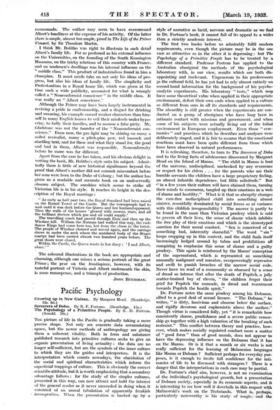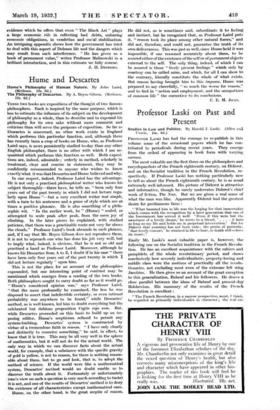Pacific Psychology
Sorcerers of Dobu. By R. F. Fortune. (Routledge. The Psychology of a Primitive People. By B.. D. Pertain. (Arnold. 30s.) The Psychology of a Primitive People. By B.. D. Pertain. (Arnold. 30s.) THE picture of life in the Pacific is gradually taking a more precise shape. Not only are concrete data accumulating . apace, but the newer methods of anthropology are giving them a coherent vitality. Both in form and substance published research into primitive cultures seeks to give an . organic presentation of living actuality : the data are no longer self-sufficient, but are the symbols of the inner culture to which they are the guides and interpreters. It is the interpretation which counts nowadays, the elucidation of the social and spiritual characteristics which inform the superficial trappings of culture. This is obviously the correct . scientific attitude, but it is worth emphasizing that a secondary . advantage follows : for the study of the simpler cultures, presented in this way, can now attract and hold the interest of the general reader as it never succeeded in doing when it consisted of an unreal tabulation of apparently freakish :incongruities. When the -presentation is backed up by a
style of narrative so lucid, nervous and dramatic as we fmd in Dr. Fortune's book, it cannot fail of its appeal to a wider than a strictly academic interest.
The first two books before us adniirably fulfil modern requirements, even though the picture may be in the one ease as attractive as in the other it is depressing : but The Psychology of a Primitive People has to be treated by a different standard. Professor Porteus has applied to the Australian aboriginal the methods of the psychological laboratory with, in our view, results which are both dis- appointing and irrelevant. Ungenerous to his predecessors in the cultural field, he has yet had to rely almost entirely on second-hand information for the background of his psycho- analytic experiments. His laboratory " tests," which may have some theoretical value when applied in their appropriate environment, defeat their own ends when applied to a culture so different from ours in all its standards -and requirements. The absurdity is still greater when the experiments are con- ducted on a group of aborigines who have long been in intimate contact with missions and government, and When some of his subjects were actually living out of the tribal environment in European employment. Even those " cere- monies " and practices which he describes and analyses were deliberately staged, and it is fair to assume that the emotional reactions must have been quite different from those which have been observed in natural performances.
It is refreshing, therefore, to turn to The Sorcerers of Doing and to the living facts of adolescence discovered by Margaret Mead on the Island of Manus. " The child in Manus is lord of the universe, undisciplined, unchecked by any reverence or respect for his elders . . . for the parents who are their humble servants the children have a large proprietary feeling, an almost infantile dependence, but little solicitude." But ‘` in a few years their culture will have claimed them, turning their minds to commerce, tangled up their emotions in a web of shame and hostility." What is it that so abruptly changes the care-free undisciplined child into something almost sinister, resentfully dominated by social forces so at variance with this childish irresponsibility ? The answer is partly to be found in the more than Victorian prudery which is said to govern all their lives, the sense of shame which inhibits the free play of their emotions and which is the stereotyped sanction for their moral conduct. " Sex is conceived of as something bad, inherently shameful." The word " sin " keeps cropping up in this context, and the child finds itself increasingly hedged around by tabus and prohibitions all conspiring to emphasise this sense of shame and a guilty prudery. This again is reinforced by the Manus' conception of the supernatural, which is represented as something unusually malignant and macabre, overpoweringly repressive and swift to punish breaches of the narrow social code. Never have we read of a community so obsessed by a sense of dread so intense that after the death of Popiteh, a jolly scatter-brained boy of eleven, " the children forgot their grief for Popitch the comrade, in dread and resentment towards Popitch the hostile spirit."
Dr. Fortune notes the same prudery among his Dobuans, allied to a good deal of sexual licence. " The Dobuan," he writes, " is dirty, lascivious and obscene below the surface, and rigidly decorous and euphemistic above the surface." Though virtue is considered folly, yet " it is remarkable how consistently shame, prudishness and a severe public censor- ship go together with a high valuation of the breaking of such restraint." This conflict between theory and practice, how- ever, which makes socially regulated conduct more a matter of " good form " than of good morals, does not appear to have the depressing influence on the Dobuans that it has on the Manus. Or is it that a month or six weeks is not really sufficient for the learning of Melanesian languages like Manus or Dobuan ? Sufficient perhaps for everyday pur- poses, is it enough to invite full confidence for the inti- macies of life to be discussed with strangers ? There is a danger that the interpretations in each case may be partial.
Dr. Fortune's chief aim, however, is not an examination of the individual's psychological growth, but a presentation of Dolman society, especially in its economic aspects, and it is interesting to see how well it dovetails in this respect with Malinowski's work on the Trobriands. What is, perhaps, • particularly noteworthy is his study of 'magic, • and the
evidence which he offers that even " The Black Art" plays a large economic role in collecting bad debts, enforcing economic obligations, in vendettas and social stabilization. An intriguing appendix shows how the government has tried to deal with this aspect of Dobuan life and the dangers which may result from such interference. " Ile has given us a book of permanent value," writes Professor Malinowski in a brilliant introduction, and in this estimate we fully concur.
J. IL DRIBERO.







































 Previous page
Previous page